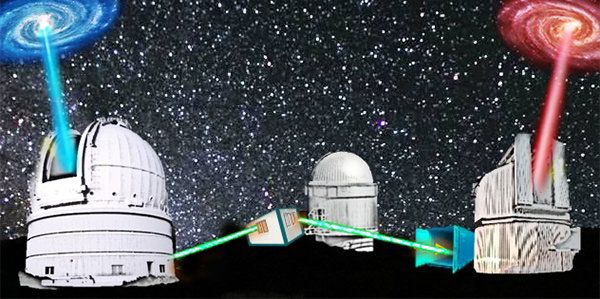The space industry is dominated by private companies, but one of the biggest banks on Wall Street is telling clients to pay attention to coming investment opportunities.



NASA is partnering with U.S. companies and small businesses to develop technologies that have the potential to significantly benefit the economy and future NASA missions.
Recent announcements of selections for the agency’s Tipping Point solicitation and Phase II of NASA’s competitive Small Business Technology Transfer (STTR) program include several proposals with NASA’s Langley Research Center in Hampton, Virginia.
NASA selected 10 Tipping Point proposals totaling approximately $44 million and Langley is a partner on one $3 million proposal. The agency also selected 20 research and technology proposals — valued at $15 million — from 19 American small businesses for STTR Phase II and Langley will manage three of the selected proposals totaling $2.25 million.

When it comes to fundamental physics, things can get spooky. At least that’s what Albert Einstein said when describing the phenomenon of quantum entanglement—the linkage of particles in such a way that measurements performed on one particle seem to affect the other, even when separated by great distances. “Spooky action at a distance” is how Einstein described what he couldn’t explain.
While quantum mechanics includes many mysterious phenomena like entanglement, it remains the best fundamental physical theory describing how matter and light behave at the smallest scales. Quantum theory has survived numerous experimental tests in the past century while enabling many advanced technologies: modern computers, digital cameras and the displays of TVs, laptops and smartphones. Quantum entanglement itself is also the key to several next-generation technologies in computing, encryption and telecommunications. Yet, there is no clear consensus on how to interpret what quantum theory says about the true nature of reality at the subatomic level, or to definitively explain how entanglement actually works.
According to Andrew Friedman, a research scientist at the University of California San Diego Center for Astrophysics and Space Sciences (CASS), “the race is on” around the globe to identify and experimentally close potential loopholes that could still allow alternative theories, distinct from quantum theory, to explain perplexing phenomena like quantum entanglement. Such loopholes could potentially allow future quantum encryption schemes to be hacked. So, Friedman and his fellow researchers conducted a “Cosmic Bell” test with polarization-entangled photons designed to further close the “freedom-of-choice” or “free will” loophole in tests of Bell’s inequality, a famous theoretical result derived by physicist John S. Bell in the 1960s. Published in the Aug. 20 issue of Physical Review Letters, their findings are consistent with quantum theory and push back to at least 7.
100 years ago, scientists thought the Milky Way was the entire universe. Imagine what we can learn from this telescope in a Chilean desert.

Check out the new website and get your ticket now! https://ukseds.org/aurora/?p=disc2018
There’s no doubt traveling the solar system would be an amazing experience, but how long would it take?
Provides some hints what hurdles would be to tackle to do excursions on Mars; also provides a lot of illustrative info about the planet.

The Hubble Space Telescope captured an image of planetary nebula NGC 3918, which is a part of the Centaurus constellation about 4,900 light-years from Earth, according to NASA.
Between the lines: A planetary nebula is a cloud of colorful gasses which surrounds a dying star — known as a red giant, according to NASA. The remnants of the star give off the light, which reflects in the gasses and creates the beautiful, dramatic colors seen in the photo.
Space.
Moon-mining enthusiasts were particularly gleeful this week when researchers claimed that they had found definitive evidence that water ice exists on the surface of the Moon. There’s even more water ice than we thought up there, too, and we know exactly where a lot of it is. That may make it even easier to mine this water in the future.
Long before this discovery, researchers have been eager to scoop up any water that may be lurking on the lunar surface. It’s a resource that could be incredibly valuable for future long-term missions on the Moon since water is essential for life to function here on Earth. It could be recycled inside a lunar habitat or used for drinking water or bathing. It could also be used to help plants grow on the Moon, which are needed to nourish future lunar inhabitants.